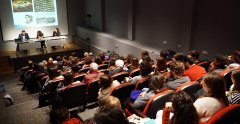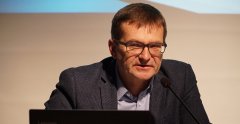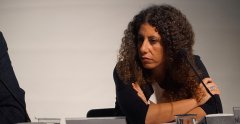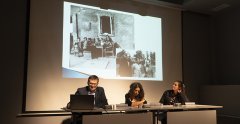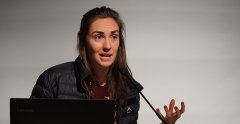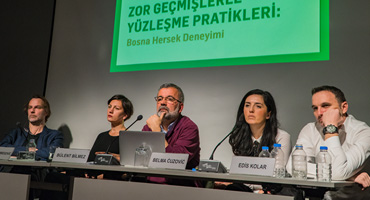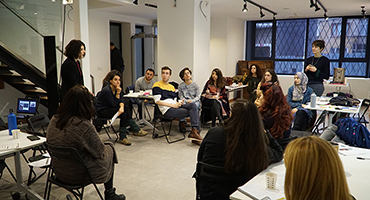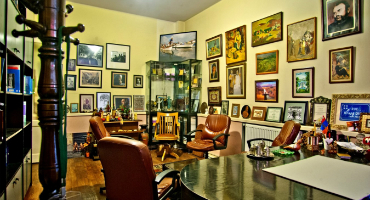The panel, “Practices of Dealing With Difficult Pasts: Transformative Education Programmes in Museums and Memory Sites” organized by the Hrant Dink Foundation and DVV International took place on 15 November 2018. The panel was moderated by the museum director of the Quincentennial Foundation Museum of Turkish Jews Nisya İşman Allovi.
The first speaker of the panel was Andrzej Kacorzyk who has been a staff member at the Auschwitz- Birkenau State Museum since 1997. Previously he was a guide in the Museum. Then in 1998, he began to work in the Education Department, AND then in the International Center for Education about Auschwitz and the Holocaust (ICEAH). Currently, he is the director of ICEAH.
Andrzej Kacorzyk made a presentation titled: “The present and the future of the education in the Auschwitz-Birkenau Memorial Site”. He mentioned that from the very beginning of the Museum's existence at the site of the former German Nazi concentration and extermination camp, its mission has been to teach about the victims, their tragedy and the history of the last preserved Holocaust Sites. He pointed out that the authenticity of Auschwitz-Birkenau and the survivors' testimonies enable people to understand the mechanisms of intolerance, racism, and anti-Semitism. He explained and show the statistics and contents of the educational activities they organize in the Museum. He said that the education programs in this site aim to lead people to reflect on the meaning of our individual responsibility. He also touched upon the questions like what role Auschwitz-Birkenau Memorial and other memorial sites could play in the future, will the visit in Auschwitz and the unique lesson from the past can be an effective vaccine against intolerance and anti-Semitism, and what should we do to break our passivity to violence and hatred?
Eğitim paneli yapıldı
https://hrantdink.org/images/hafizamekani/donusturucuegitimpaneli/egitimpaneliyapildi/DSC02961.JPG
https://hrantdink.org/images/hafizamekani/donusturucuegitimpaneli/egitimpaneliyapildi/DSC02966.JPG
https://hrantdink.org/images/hafizamekani/donusturucuegitimpaneli/egitimpaneliyapildi/DSC02969.JPG
https://hrantdink.org/images/hafizamekani/donusturucuegitimpaneli/egitimpaneliyapildi/DSC02976.jpg
https://hrantdink.org/images/hafizamekani/donusturucuegitimpaneli/egitimpaneliyapildi/DSC02982.JPG
The second speaker of the panel was Georgina Marques who is currently working for the Apartheid Museum developing an educational programme at the Nelson Mandela Capture Site in Howick, KZN. Firstly she shortly explained the Apartheid in South Africa to show the participants the context. She mentioned the history of the Apartheid Museum which opened its doors to the public in 2001. Then she talked about the education programme at the Museum, mentioning how they engaged in schools, by preparing their own textbook and museum workshop and how they organize educator and guide training. She told that through these commitments for giving priority to education She also brought up the challenges that South African museums face when it comes to engaging school groups: like language barriers, unequal education standards, cultural differences, accessibility, resources, and funding.


